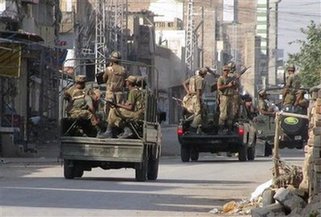
Pakistan Army troops prepare to leave for patrolling during a curfew in Bannu, a town on the edge of Pakistan's lawless tribal belt Waziristan, Saturday, Oct. 17, 2009. [Agencies]
DERA ISMAIL KHAN, Pakistan: Pakistani soldiers attacked militant bases in the main al-Qaida and Taliban stronghold along the Afghan border Saturday as the nuclear-armed country launched its most critical offensive yet against insurgents threatening its stability.
 Pakistan Army troops prepare to leave for patrolling during a curfew in Bannu, a town on the edge of Pakistan's lawless tribal belt Waziristan, Saturday, Oct. 17, 2009. [Agencies] |
The US has pushed Pakistan to mount the offensive, which follows three unsuccessful campaigns since 2001 in the mountainous, remote region by mostly poorly equipped soldiers trained to fight conventional wars, not counterinsurgency operations.
The assault, which has been planned for several months, comes after a surge in militant attacks killed more than 175 people across Pakistan over the past two weeks. The operation is expected to last around two months and is aimed at clearing the region, then holding it, officials said.
About 10,000 local militants and about 1,500 foreign fighters, most of them from Central Asia, control roughly 1,275 square miles (3,310 square kilometers) of territory, or about half of South Waziristan.
Intelligence officials said the ground troops Saturday were advancing on two flanks and a northern front of a central part of South Waziristan controlled by the Mehsuds. The areas being surrounded include the insurgent bases of Ladha and Makeen, the officials said on condition of anonymity because they were not allowed to brief the media.
Gunbattles were taking place outside Spinkai Raghzai, Kalkala and Sharwangai areas, the officials said.
As many as 150,000 civilians — possibly more — have left in recent months after the army made clear it was planning an assault. Most are believed to be staying in rented homes or with host families, but there are perhaps as many as 350,000 still in the region. The United Nations has been stockpiling relief supplies in a town near the region, but authorities are not expecting a major refugee crisis like the one that occurred during an offensive this year in the Swat Valley, also in the northwest.
Makeen resident Ajmal Khan said that the people left in his town were terrified but could not leave their homes due to a curfew.
"We heard sounds of planes and helicopters early Saturday. Then we heard blasts," Khan told The Associated Press by telephone. "We are also hearing gunshots and it seems the army is exchanging fire with the Taliban."
Over the last three months, the Pakistani air force has been bombing targets, while the army has said it has sealed off many Taliban supply and escape routes. The military has been trying to secure the support of local tribal armies in the fight.
At least 11 suspected insurgents were killed in the jet bombings, while a roadside bomb hit a security convoy, killing one soldier and wounding three others, two local intelligence officials said. A military statement Saturday evening said four soldiers were killed and 12 wounded in exchanges in the region.
It is nearly impossible to independently verify information from the region, which has little infrastructure or government presence. Foreigners require permission to enter the tribal areas, and few Pakistani journalists from other parts risk traveling there.
Recent opinion polls show widespread public support for military action against the insurgents and there is also broad political backing, a change from a few years ago. But a long and bloody conflict — and more terrorist attacks around the country — could erode that support.
Even if the army retakes the area, the offensive by itself is unlikely to be death blow to the country's entrenched militants, who have formed networks across the country, including with groups once nurtured by the state as proxies against its arch enemy India.
The militants could escape to other parts of Pakistan's semiautonomous tribal belt or cities in its heartland. The areas being targeted by the operation don't directly border Afghanistan, which could limit the impact on US, Afghan and NATO troops battling a resurgent Afghan Taliban.
Pakistan waged offensives in the Bajur and Mohmand tribal regions earlier this year that it hailed as successes. But militants are still active in both and there has been little reconstruction.
South Waziristan is also much farther that those two regions from the main northwestern city of Peshawar, meaning keeping the troops supplied will be much harder.
Since the US-led invasion of Afghanistan in 2001, the Pakistan army's three attempts to dislodge Taliban fighters from South Waziristan have ended in truces that left the Taliban in control. This time, the military has said there will be no deals, partly to avoid jeopardizing gains won earlier this year when Pakistani soldiers overpowered the Taliban in Swat.
The army's efforts in South Waziristan got a boost when a US missile strike killed Pakistani Taliban chief Baitullah Mehsud in August. The militants have since named fellow tribesman Hakimullah Mehsud as their leader, and have claimed responsibility for most of the recent attacks, including a 22-hour standoff at the army's headquarters.
Taliban spokesmen could not immediately be reached for comment Saturday. Communications in and around the region appeared jammed, making it difficult to reach local residents or other witnesses.
The US is trying to rush in equipment for the offensive that would help with mobility, night fighting and precision bombing, a US Embassy official told AP in a recent interview, speaking on condition of anonymity because the issue is politically sensitive.
In addition to night-vision devices, the Pakistan military has said it is seeking additional Cobra helicopter gunships, laser-guided munitions and intelligence equipment to monitor cell and satellite telephones.
Army planners are also considering the weather. Snows expected in the coming weeks could block major roads in South Waziristan. At the same time, the winter could work to the army's advantage by driving fighters out of their unheated mountain hide-outs.